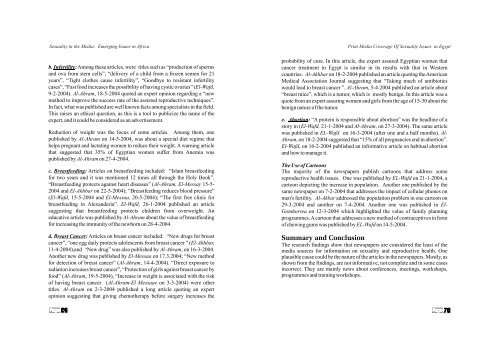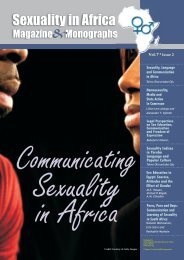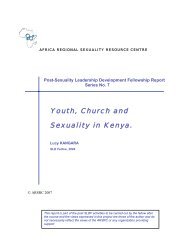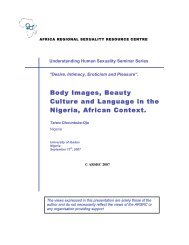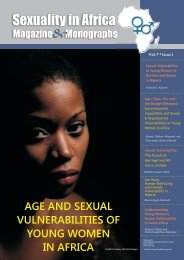Sexuality in Media: Emerging Issues in Africa - Africa Regional ...
Sexuality in Media: Emerging Issues in Africa - Africa Regional ...
Sexuality in Media: Emerging Issues in Africa - Africa Regional ...
Create successful ePaper yourself
Turn your PDF publications into a flip-book with our unique Google optimized e-Paper software.
<strong>Sexuality</strong> <strong>in</strong> the <strong>Media</strong>: Emerg<strong>in</strong>g <strong>Issues</strong> <strong>in</strong> <strong>Africa</strong><br />
b. Infertility: Among these articles, were titles such as “production of sperms<br />
and ova from stem cells”; “delivery of a child from a frozen semen for 21<br />
years”, “Tight clothes cause <strong>in</strong>fertility”, “Goodbye to resistant <strong>in</strong>fertility<br />
cases”, “Fast food <strong>in</strong>creases the possibility of hav<strong>in</strong>g cystic ovaries” (El-Wafd,<br />
9-2-2004). Al-Ahram, 18-5-2004 quoted an expert op<strong>in</strong>ion regard<strong>in</strong>g a “new<br />
method to improve the success rate of the assisted reproductive techniques”.<br />
In fact, what was published are well known facts among specialists <strong>in</strong> the field.<br />
This raises an ethical question, as this is a tool to publicize the name of the<br />
expert, and it could be considered as an advertisement.<br />
Reduction of weight was the focus of some articles. Among them, one<br />
published by Al-Ahram on 14-5-2004, was about a special diet regime that<br />
helps pregnant and lactat<strong>in</strong>g women to reduce their weight. A warn<strong>in</strong>g article<br />
that suggested that 35% of Egyptian women suffer from Anemia was<br />
published by Al-Ahram on 27-4-2004.<br />
c. Breastfeed<strong>in</strong>g: Articles on breastfeed<strong>in</strong>g <strong>in</strong>cluded: “Islam breastfeed<strong>in</strong>g<br />
for two years and it was mentioned 12 times all through the Holy Book”.<br />
“Breastfeed<strong>in</strong>g protects aga<strong>in</strong>st heart diseases” (Al-Ahram, El-Messay 15-5-<br />
2004 and El-Akhbar on 22-5-2004); “Breastfeed<strong>in</strong>g reduces blood pressure”<br />
(El-Wafd, 15-5-2004 and El-Messaa, 20-5-2004); “The first free cl<strong>in</strong>ic for<br />
breastfeed<strong>in</strong>g <strong>in</strong> Alexanderia”. El-Wafd, 26-1-2004 published an article<br />
suggest<strong>in</strong>g that breastfeed<strong>in</strong>g protects children from overweight. An<br />
educative article was published by Al-Ahram about the value of breastfeed<strong>in</strong>g<br />
for <strong>in</strong>creas<strong>in</strong>g the immunity of the newborn on 28-4-2004.<br />
d. Breast Cancer: Articles on breast cancer <strong>in</strong>cluded: “New drugs for breast<br />
cancer”, “one egg daily protects adolescents from breast cancer ” (El-Akhbar,<br />
11-4-2004),and “New drug” was also published by Al-Ahram, on 16-3-2004.<br />
Another new drug was published by El-Messaa on 17.3.2004; “New method<br />
for detection of breast cancer” (Al-Ahram, 14-4-2004). “Direct exposure to<br />
radiation <strong>in</strong>creases breast cancer”, “Protection of girls aga<strong>in</strong>st breast cancer by<br />
food” (Al-Ahram, 19-5-2004), “Increase <strong>in</strong> weight is associated with the risk<br />
of hav<strong>in</strong>g breast cancer (Al-Ahram-El Messaae on 3-3-2004) were other<br />
titles. Al-Ahram on 2-3-2004 published a long article quot<strong>in</strong>g an expert<br />
op<strong>in</strong>ion suggest<strong>in</strong>g that giv<strong>in</strong>g chemotherapy before surgery <strong>in</strong>creases the<br />
Pr<strong>in</strong>t <strong>Media</strong> Coverage Of <strong>Sexuality</strong> <strong>Issues</strong> <strong>in</strong> Egypt<br />
probability of cure. In this article, the expert assured Egyptian women that<br />
cancer treatment <strong>in</strong> Egypt is similar <strong>in</strong> its results with that <strong>in</strong> Western<br />
countries. Al-Akhbar on 18-2-2004 published an article quot<strong>in</strong>g the American<br />
Medical Association Journal suggest<strong>in</strong>g that “Tak<strong>in</strong>g much of antibiotics<br />
would lead to breast cancer ”. Al-Ahram, 5-4-2004 published an article about<br />
“breast mice”, which is a tumor, which is mostly benign. In this article was a<br />
quote from an expert assur<strong>in</strong>g women and girls from the age of 15-30 about the<br />
benign nature of the tumor.<br />
e. Abortion: “A prote<strong>in</strong> is responsible about abortion” was the headl<strong>in</strong>e of a<br />
story <strong>in</strong> (El-Wafd, 21-1-2004 and Al-Ahram, on 27-3-2004). The same article<br />
was published <strong>in</strong> EL-Wafd on 16-3-2004 (after one and a half months). Al-<br />
Ahram, on 18-2-2004 suggested that “15% of all pregnancies end <strong>in</strong> abortion”.<br />
El-Wafd, on 16-2-2004 published an <strong>in</strong>formative article on habitual abortion<br />
and how to manage it.<br />
The Use of Cartoons<br />
The majority of the newspapers publish cartoons that address some<br />
reproductive health issues. One was published by EL-Wafd on 21-1-2004, a<br />
cartoon depict<strong>in</strong>g the <strong>in</strong>crease <strong>in</strong> population. Another one published by the<br />
same newspaper on 7-2-2004 that addresses the impact of cellular phones on<br />
men's fertility. Al-Akbar addressed the population problem <strong>in</strong> one cartoon on<br />
29-3-2004 and another on 7-4-2004. Another one was published <strong>in</strong> El-<br />
Gomhorrea on 12-3-2004 which highlighted the value of family plann<strong>in</strong>g<br />
programmes. A cartoon that addresses a new method of contraceptives <strong>in</strong> form<br />
of chew<strong>in</strong>g gums was published by EL-Wafd on 14-5-2004.<br />
Summary and Conclusion<br />
The research f<strong>in</strong>d<strong>in</strong>gs show that newspapers are considered the least of the<br />
media sources for <strong>in</strong>formation on sexuality and reproductive health. One<br />
plausible cause could be the nature of the articles <strong>in</strong> the newspapers. Mostly, as<br />
shown from the f<strong>in</strong>d<strong>in</strong>gs, are not <strong>in</strong>formative, not complete and <strong>in</strong> some cases<br />
<strong>in</strong>correct. They are ma<strong>in</strong>ly news about conferences, meet<strong>in</strong>gs, workshops,<br />
programmes and tra<strong>in</strong><strong>in</strong>g workshops.


